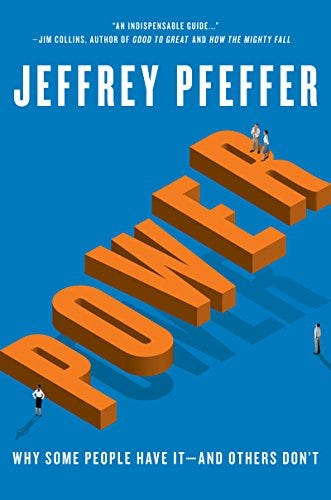high signal digest #16
"Power: Why some have it and others don't" + stuff i read this week you might enjoy
est. reading time = 2.5min
Today at a glance:
Summary of “Power: why some people have it and others don’t” by Jeffrey Pfeffer. He breaks down what makes some people powerful. Pfeffer is a Stanford prof.
Stuff i read this week you might enjoy

Why did I read this?
Teammate bought it for me last year. I believe in a just world where your character and your output are tied to power. But the world isn’t just. I struggle with power dynamics, do not engage in power games, and resent those who are good at climbing. I’ve been working on changing my POV after reading this book. I haven’t made much progress.
Raw notes from the book
Stop thinking the world is fair. People competing for advancement bend the rules and win
Don’t trust all leadership advice. Leaders touting their success skip the games they played to get to the top
Get noticed, reframe KPIs to match your strengths, keep boss looking good, don’t leave your reviews to change, be a sycophant1
How picking where to start (your department) can impact power dynamics: profitable or strategically important team can be competitive, but the tide will carry you to the top vs weaker team with lower expectations
Ask for help or opinions. People enjoy flattery + you have nothing to lose. Engage in self-promotion. Get noticed. Power creates likability: winning → momentum → more people support you → more people like you
Build your power base by helping people. Do small important visible tasks.
Network. Weak ties > strong ties
Acting with power: express emotions/anger = high status, eye contact, take the time to respond, watch how you come off in every interaction = be ON, use lists, lean on us-vs-them rhetoric
Image creates reality. Self-promote and have others speak on your behalf
Don’t take things personally. Make important relationships work, at all costs
Leave people an out when arguing
Attach yourself to higher objectives (ex. shareholder value). They are indisputable
Price of power: (1) public scrutiny, (2) people tell say you are right a lot = absence of truth/feedback, (3) addictive
Do not be overconfident or insensitive once in position of power
Leave gracefully. Leave before the party is over
Take care of yourself. Don’t expect justice
Typing these notes I find myself disagreeing with some of this. So it’s a good gift and it’s healthy that I read it. Maybe I will change my mind.
Yes, the world is unfair and people climb.
Power does create leverage. We use leverage to make an impact so power is worth fighting for. What would it take to pave a more meaningful path to power? Could we build “fair” teams? How would that look like?
Quotes from the book that stuck:
Do not complain about how life isn’t fair, or that your organization culture isn’t healthy, or that your boss is a jerk. You have both the responsibility and the potential to change your situation, either in your present job or in some new place. Stop waiting for things to get better or for other people to acquire power and use it in a benevolent fashion to improve the situation. It’s up to you to build your own path to power
people will join your side if you have power and are willing to use it, not just because they are afraid of your hurting them but also because they want to be close to your power and success
Stuff I read this week that you might enjoy
The build-nothing country. Stasis has become America’s spoils system and it can’t go on
Study on Harvard finds 43% of white students are legacy, athletes, or related to donors or staff
Honestly, it’s probably the phones. The most plausible explanation for teenage unhappiness
disagree with all of this and a lot of the other bullets. good! maybe i will change my mind on this

